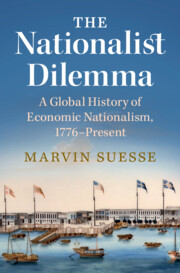Book contents
- The Nationalist Dilemma
- The Nationalist Dilemma
- Copyright page
- Dedication
- Contents
- 1 Introduction: Nationalists Think About the Economy
- 2 The American Community of the Common Man, 1776–1860
- 3 The Birth of the National Economy in Europe, 1789–1860
- 4 The Globalisation of the Nation, 1861–1913
- 5 The Nationalist as Saviour, 1914–1945
- 6 Policy in a World of Nation-States, 1946–1978
- 7 The Incomplete Building of a Global Economy, 1979–2001
- 8 Populist Discontents, 2002–2021
- 9 Conclusion and Outlook: Explaining Economic Nationalism
- Notes
- Index
3 - The Birth of the National Economy in Europe, 1789–1860
Published online by Cambridge University Press: 25 April 2023
- The Nationalist Dilemma
- The Nationalist Dilemma
- Copyright page
- Dedication
- Contents
- 1 Introduction: Nationalists Think About the Economy
- 2 The American Community of the Common Man, 1776–1860
- 3 The Birth of the National Economy in Europe, 1789–1860
- 4 The Globalisation of the Nation, 1861–1913
- 5 The Nationalist as Saviour, 1914–1945
- 6 Policy in a World of Nation-States, 1946–1978
- 7 The Incomplete Building of a Global Economy, 1979–2001
- 8 Populist Discontents, 2002–2021
- 9 Conclusion and Outlook: Explaining Economic Nationalism
- Notes
- Index
Summary
This chapter shifts the focus to Europe in the early nineteenth century, where three important archetypes of economic nationalism were conceived. The first two were isolationist. Protectionists in France promoted disengagement from the world economy to forestall a rise in economic inequality which they feared might undermine national unity. Romanticist philosophers such as Adam Müller and Johann Gottlieb Fichte in Germany saw intensifying trade as eroding ‘traditional’ national and cultural values, which led them to advocate strict autarky. Friedrich List drew on these ideas, but also on developmental American approaches, in particular Alexander Hamilton’s ideas. He crafted an intellectual synthesis that sought to spur industrialisation by managing trade. However, List was unable to solve the tension between an ideology defending the economic sovereignty of small nations and one advocating imperialist expansion in search for markets, land and resources.
Keywords
- Type
- Chapter
- Information
- The Nationalist DilemmaA Global History of Economic Nationalism, 1776–Present, pp. 44 - 75Publisher: Cambridge University PressPrint publication year: 2023

